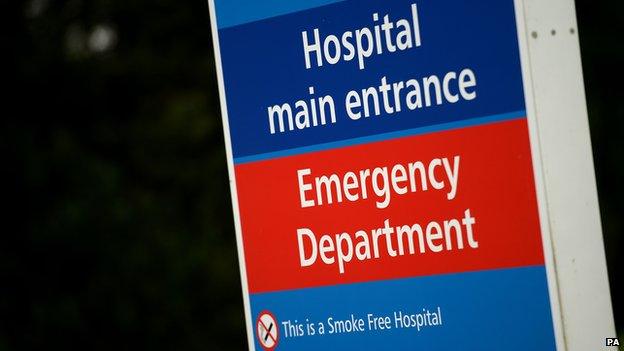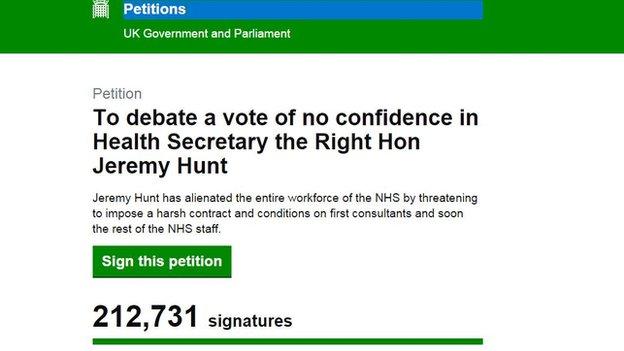Consultants, a seven-day NHS and that petition
- Published

It's August and the holiday season but even so talks between NHS employers and the British Medical Association have just got under way over the vexed issue of consultants' contracts.
Government plans to remove the right of senior doctors to opt out of weekend working have provoked an angry response.
In a sign of the sensitivity of the issue, there have been differences of opinion over the status of the talks.
The Department of Health argued it was "encouraging" that both sides were sitting down for discussions. The BMA response was that these talks, which also cover junior doctors' contracts, are "exploratory" and it should not be presumed that they will definitely pave the way for substantive negotiations.
The Health Secretary Jeremy Hunt called in mid-July for the BMA to decide quickly whether to enter negotiations over seven-day working for consultants in non-emergency care.
If there was no decision within six weeks, he said, he would impose a new contract for newly qualified consultants. The Whitehall interpretation of when those six weeks expire is mid-September, allowing for holidays.
It is understood that BMA consultants' representatives will review early next month whether there is scope, in their view, for formal negotiations to take place.
Higher death rates
Mr Hunt's argument is that the public should be entitled to an NHS which provides a genuinely seven-day service.
He says patients can be needlessly detained in hospital over a weekend because consultants are not available till Monday to analyse test results and authorise discharges.

He has repeatedly pointed to higher death rates for weekend admissions - 16% higher on a Sunday and 11% higher on a Saturday compared to admissions on a Wednesday.
Some have argued, though, that this has more to do with people arriving at hospital more seriously ill at weekends than during the week, rather than anything to do with staffing.
Questions have been asked about the Government's suggestion that 6,000 excess deaths per year are caused by what's described as the "Monday to Friday culture" in the NHS.
Officials said that this figure had been extracted from research which is due to be published soon.
Sir Bruce Keogh, medical director of NHS England, has for some while been trying to encourage hospitals to move towards a more extensive weekend service.
He and his officials have been working on an authoritative analysis of higher death rates for patients admitted at weekends.
They say it is an issue facing international healthcare systems as well as the NHS and want to develop a consensus on tackling the problem and changing working practices.
Twitter campaign
Consultants, both through their union the BMA and personally on social media, have voiced their anger at what they see as a provocative move by Mr Hunt.
A Twitter campaign branded #ImInWorkJeremy, external was launched by doctors working over the weekend after the Secretary of State's announcement.

They are aggrieved at suggestions they only work Monday to Friday. Many consultants already work or are on call on some weekends.
What's not clear is how many consultants exercise their right not to work at weekends and how much senior doctor weekend cover there is at different hospitals.
Some trusts have already introduced contracts obliging consultants to work on Saturdays and Sundays if required. Others pay a locally negotiated premium for weekend work.
The government says these local deals are sometimes too costly and there should be a single nationally negotiated weekend rate.
While battle lines have formed, Mr Hunt himself has become the focus of much of the doctors' criticism.
An online petition has called for a parliamentary debate, external and vote of no confidence in the health secretary - it has gathered more than 212,000 signatures, well above other such petitions since the election but not yet at the level of a couple organised during the last parliament such as a demand to stop the badger cull.
Any petition with more than 100,000 signatures has to be considered for a debate by a parliamentary committee. The government response is to re-state its commitment to making NHS care at weekends as safe as during the week through the delivery of seven-day services.
The debate will simmer on during the sluggish August weeks ahead. It may come to the boil next month as MP's return from their holidays and consultants' leaders deliver their verdict on talks over the government's plans.